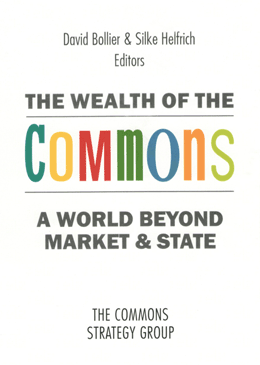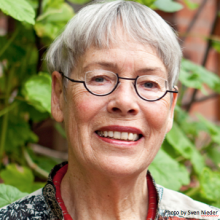Since 1985, an intentional community of about 100 adults and 40 children in the middle of Lower Saxony, Germany, has created the “Lebensgarten Steyerberg” out of a munitions factory housing project built in the late 1930s for World War II. The anchor of the community, which is spread out over 65 buildings, is a large community building that serves as a cultural and social center. It has offices, a kitchen and converted hospital space now used for various seminars on health-related topics, including dance, massage and nutrition, together with the so-called Heilhaus (a former hospital now called the Healing Center).
One of the greatest miracles that we experienced here at Lebensgarten (in English, the Garden of Life), is the greater diversity of skills that people somehow find and develop when the kind of specialists available in major cities are not around. Self-reliance opens up both the opportunity and the necessity to develop new competencies. This has enabled us to discover an entirely new quality of life and new dimensions of personal growth – which is precisely what is needed in the post-growth economy that is nearly upon us. The potential for growth in quality of life is limitless. We would like to present a few examples to illustrate what that means in Lebensgarten, what it requires of us and how it enables us to save resources.
It all began in 1985 with the conversion of the houses and the 2,000-square-meter community center. By focusing on conversion instead of new construction, we needed less building material, less energy for transportation and less labor. Each of us contributed what we could and was allowed to make progress in our own time. Each room in the community center was renovated on the basis of a different financing model, which included partly private, partly communal, and partly a combination of the two. Our respective projects have been financed in many different ways – through membership fees, donations, reduced-interest or interest-free loans from residents and friends, income from the seminar program bank loans as well as sweat equity. We have avoided loans as much as possible because our income varies from year to year.
We would never have believed that something like this would work so well before experiencing it in practice. Part of the reason is that we organize our voluntary work for projects so that participating is fun.
One of the most important systems that we created is the Food Distribution Center, called LeDi, which lets us avoid the need for shopping trips. At the LeDi, we can get practically all the organic food and environmentally friendly products that we need, and at wholesale prices. All the adults and the older teenagers have keys for the LeDi, so they can help themselves to what they need at any time of day or night, deducting the price from the advance deposits they have made. This system makes it easier for them to stock the amounts of foods they need, and has been working for several years.
In addition to comprehensive, practical neighborly assistance in every situation, several people who live in Lebensgarten share a pool of vehicles. People can hang clothes they no longer need in the boutique, where others can take them free of charge. About half the residents of Lebensgarten have created their own jobs on site, mostly providing social or health services and skilled crafts and trades. The Lebensgarten has advanced to become the second-largest provider of accommodation in the region due to the rooms available in private homes and the lodgings at the Heilhaus. Lebensgarten is also a nucleus for new business start-ups and offers an innovative milieu for cooperative alliances of freelancers that is usually found only in major cities. Besides dance, yoga and other kinds of exercise programs, Lebensgarten also has a pub – which occasionally runs a disco – and a café that is open Sundays and features our baker’s outstanding organic cakes.
Lebensgarten’s kitchen offers everybody the splendid opportunity to enjoy tasty and wholesome meals and conversations with a diverse mix of diners instead of having to cook alone. We decided on vegetarian food grown organically because meat and milk consumption could be responsible for half of all greenhouse gas emissions, according to the newest calculations. Of course, everyone is free to prepare their own meals as they please at home.
It seems to me that our experience in handling conflicts is even more important than our use of multiple skills, spaces, cars and equipment. The most astonishing thing is that Lebensgarten is still in existence at all. According to most academic literature about communities, we should have broken up long ago because of internal conflicts. We are, after all, a whole cosmos of many different religious, spiritual and philosophical schools of thought. We are anything but uniform in terms of our ages, educations, incomes, backgrounds and professional experiences. Most of us had our own ideas about what the community was to look like or how it was supposed to work. That caused tensions time and again because nobody had grown up in such a community or knew the rules of the game for this kind of social cooperation. So we have had to devise the rules ourselves, and develop them further day by day with everyone who joined the community. One rule for conflicts is that we ask a neutral person to mediate between those involved in the conflict. If that does not prove successful, we use a more formal process of mediation.
So far, we have used a modified consensus procedure to make all the important decisions. If someone does not agree with a decision that affects her or him, then that person must be asked whether she or he could live with the decision nonetheless if it were made. If not, then the decision is not made in the overwhelming majority of cases. All in all, this procedure is faster and more sustainable than the democratic voting procedures we are familiar with from many other group settings, because there, those who are voted down may later try to undermine the decision in some way – possibly even subconsciously.
In Lebensgarten, nobody is forced to do anything except obey the rules of the community and pay a fee of about 30 euros per month to the community coffers. Every single person is responsible for himself or herself, and everyone knows that this means that they bear responsibility for the community as a whole. This knowledge is passed along to people from outside in numerous enterprises and groups, including vegetarian cooking courses, the School for Understanding and Mediation, the Center for Non-Violent Communication Steyerberg, the Association for Mindfulness and Understanding, the forest kindergarten and the local Artabana group, a supportive community of patients that offers a self-organized alternative to the state health insurance system. Many people involved and engaged in these groups do not live in Lebensgarten, and the various forms of mediation serve as bridges between people who live here or outside the community. The Gaia Action-Learning Academy for Sustainability (GALA) is an educational institution that combines action learning with permaculture and other approaches to implement business goals for a healthy and sustainable world in practical ways.
The Lebensgarten kitchen has been increasing its use of fruit, vegetables and flowers produced here since the development of a permaculture park (PaLS) directly next to our grounds. In the final analysis, the growing number of decentralized structures means greater autonomy for all of us.
We have come to realize that wealth does not mean accumulating money. Instead, it comes alive in the quality of relationships among people. Wealth is multiplied in the opportunities to communicate with one another at a deep level, to celebrate special occasions, to develop rituals or to explore new patterns of relationships. We do not experience this as “doing without,” but rather as a model that makes all of us richer together. Nature has been doing this for millions of years. The economic system is all about diversity, not sameness. It consists of cycles, not competition. Only with mutual understanding and creative connections among ourselves can a human society flourish.
 Buy at Levellers Press
Buy at Levellers Press 